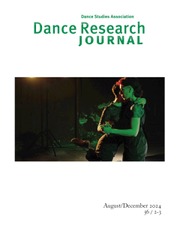Article contents
Dance and the Political: States of Exception
Published online by Cambridge University Press: 22 July 2014
Extract
My first idea was to compare Ausdruckstanz literature to work in other fields on the theorization of fascist aesthetics. This would establish a critical framework for the vexed question of the fascistization of German modern dance. As the research of Susan Manning, Marion Kant, and Laure Guilbert has made patently evident, Ausdruckstanz begs the question of dance and politics because of the easy and massive accommodation of German modern dance to the cultural policies of the Third Reich. The history of Ausdruckstanz has long been veiled, but the original research of these scholars persuades us to reconsider dance modernism from the political perspective. An early twentieth-century avant-garde art movement and an authoritarian state apparatus encounter each other at a moment crucial in the development of each; something new is being created, both artistically and politically, that reveals contradictory forces and tendencies at work. Only when these dance scholars lifted the veil and rewrote history could we begin to perceive dance in the full light of the political. They have inaugurated an area of inquiry that requires further work. But any serious critical development of dance study methodology must also be tested against their re-evaluation Ausdruckstanz.
- Type
- Articles
- Information
- Copyright
- Copyright © Congress on Research in Dance 2006
References
Works Cited
- 25
- Cited by


